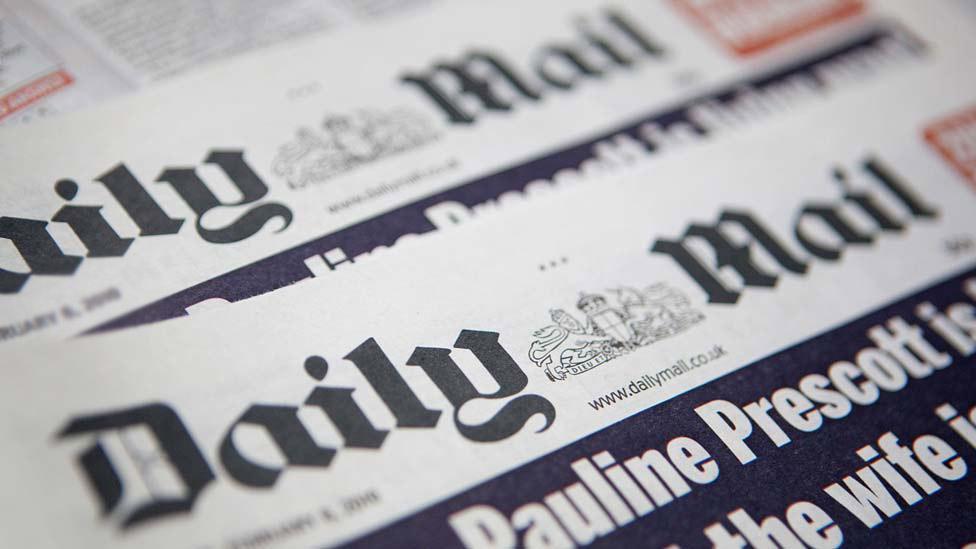Daily Mail mobilises big names for premium offer
- Published

The long heralded next chapter of the Daily Mail's push into digital media will take shape this week, as consolidation across Fleet Street gathers pace and publishers who built businesses on clicks reel from the latest tweaks to algorithms crafted in Silicon Valley.
Mail+, a premium service which has already soft-launched, will this week see columnist Andrew Pierce become host of a daily radio show from just next to the Mail newsroom. The Daily Show will air at 5pm each day, from Wednesday. Pierce has presented radio programmes for many years, not least on LBC.
Pierce's show may benefit in the short term from sharing a title with the hit American TV programme now hosted by Trevor Noah.
Veteran political editor Simon Walters and columnist Amanda Platell are also launching a weekly podcast, called Order! Order!; and TV journalist and author Michael Crick is to present a weekly video and briefing on Wednesdays.
Mail+ follows in the footsteps of, and is inspired by, similar services from The Times and New York Times among others. The Daily Show may come to resemble the successful New York Times podcast The Daily. Certainly, Mail bosses would be thrilled with a fraction of the latter's success.
Mail+ will differ from Mail Online - to which it is wholly separate - by eventually charging readers for some upmarket content. Like those offerings from rival publishers, the idea is to deepen engagement with the Mail brand, and the journalists who represent it.
The basic Mail+ service will be free; some paid-for products will be released in the coming months. What those products are, and how much they will cost, isn't yet clear. Big name columnists including Sarah Vine and a Richard Littlejohn are likely to be a prominent part of the offer.
The core of Mail+ will be a bulletin-based digital service, in the form of daily briefings at 7am, 12 noon and 5pm. It is being run by Tristan Davies, the former editor of The Independent on Sunday and deputy editor of the Mail on Sunday. His team, of around 40, are to be based in the Mail's newsrooms, and will report to Geordie Greig, the editor of the Mail.
Multiple models
Why is the Mail doing this? It represents the most significant new iteration of its journalism since the launch, under Paul Dacre, of Mail Online. To future-proof their businesses, newspapers are having to diversify, pursuing different business models at the same time, hoping each will help fund journalism in an age of - paradoxically - unprecedented competition among publishers, and immense concentration of power among tech giants.
Even 20 years ago, newspapers basically earned money via the printed product, from advertising (display and circulation ads) and reader payments. Now they have to make money via their websites too, as well as other products such as events. And even within the digital business, there are different sources of revenue.
Mail Online has proved wildly popular through a remorseless pursuit of all the various techniques that get people reading online: strong presentation, big pictures, grabby headlines, vigorous search engine optimisation, and celebrity content.
Mail+ will contribute to the bottom line differently: both direct reader revenue (when they start charging for products), and promoting the Mail brand to those who engage with it.
It should also be seen as something of an experiment in a model which may be more durable than relying on social media behemoths like Facebook to send you traffic. Just last week Mark Zuckerberg launched a new news service on his platform; but every publisher knows that building a business on the whim of Californian techies is dangerous. Ten years from now, who knows if that revenue will dry up. Safer, perhaps, to rely on readers who pay.
New chapters
The Mail's parent company has been mooted as a potential buyer for The Daily Telegraph. News that the Telegraph is for sale was first reported, external on Friday by Richard Fletcher of The Times.
It should be remembered that the Mail group tried to buy the Telegraph the last time it was for sale. It was beaten to it by the Barclay brothers. According to the Financial Times, the Mail's owner was rebuffed when he approached the Barclays about a sale more recently.
Today, the weakness of the British newspaper by historic standards may mitigate concerns over competition. And Mail executives may argue that if News UK can own both The Sun and The Times, they should be allowed to own the Mail and Telegraph. That will be a matter for regulators, if ever such a bid should come about. And it may depend to some degree on the result of the Mail group's current attempt to buy the i newspaper.
The Mail's ferocious conservatism, external has made it one of the most powerful, and at times controversial, brands in British media. The amusing contretemps, external between current and former editors played out in the letters pages of the Financial Times recently shows how it is navigating a new path.
Greig's pragmatic rather than ideological approach to Brexit has been the source of much more commentary than the Mail's commercial evolution. But these days, editors are judged not merely by their story selection and journalistic impact, but how they navigate the digital challenge.
In replacing Dacre, the most influential print journalist of his generation, the task Greig would have been given by Jonathan Harmsworth, the Mail's owner (also known as Lord Rothermere) is to keep the paper relevant editorially while building a digital business in which the power ultimately lies in Kensington rather than California. That is the point of Mail+. Like others before it, this seems a necessary and low-risk bet, as long as costs are controlled.
